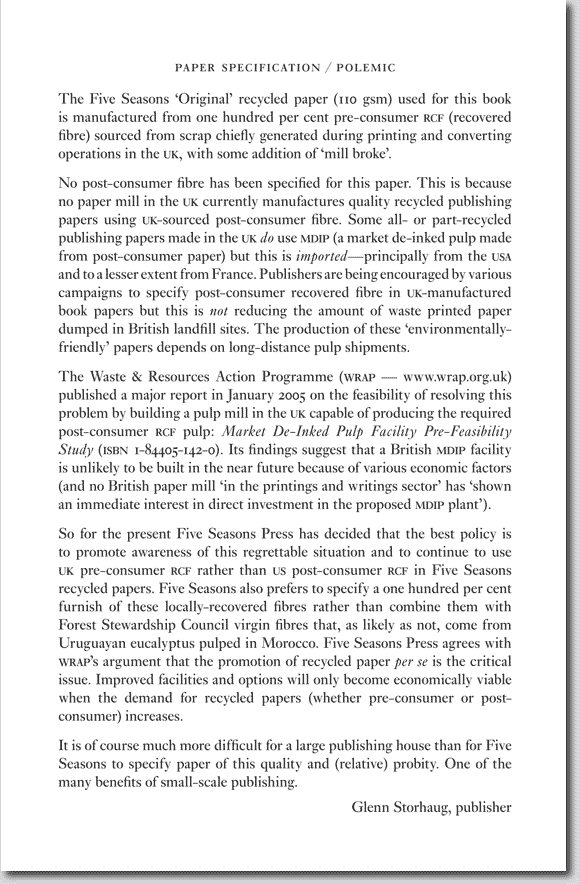Five Seasons paper
Note: this was written in 2005 and the paper fibre discussion may require an update.
Five Seasons high-quality recycled papers have been made since 1987. Current campaigns demand that 'environmentally-concerned’ publishers use post-consumer fibre in their book papers. Because this expectation is not matched by an understanding of the issues involved, Five Seasons Press is printing the following text at the back of its new publications.

Paper specification / polemic
The Five Seasons ‘Original’ recycled paper (110gsm) used for this book is manufactured from one hundred per cent pre-consumer RCF (recovered fibre) sourced from scrap chiefly generated during printing and converting operations in the UK, with some addition of ‘mill broke’.
No post-consumer fibre has been specified for this paper. This is because no paper mill in the UK currently manufactures quality recycled publishing papers using UK-sourced post-consumer fibre. Some all- or part-recycled publishing papers made in the UK do use MDIP (a market de-inked pulp made from post-consumer paper) but this is imported—principally from the USA and to a lesser extent from France. Publishers are being encouraged by various campaigns to specify post-consumer recovered fibre in UK-manufactured book papers but this is not reducing the amount of waste printed paper dumped in British landfill sites. The production of these ‘environmentally-friendly’ papers depends on long-distance pulp shipments.
The Waste & Resources Action Programme (WRAP) published a major report in January 2005 on the feasibility of resolving this problem by building a pulp mill in the UK capable of producing the required post-consumer RCF pulp: Market De-Inked Pulp Facility Pre-Feasibility Study (ISBN 1-84405-142-0). Its findings suggest that a British MDIP facility is unlikely to be built in the near future because of various economic factors (and no British paper mill ‘in the printings and writings sector’ has ‘shown an immediate interest in direct investment in the proposed MDIP plant’).
So for the present Five Seasons Press has decided that the best policy is to promote awareness of this regrettable situation and to continue to use UK pre-consumer RCF rather than US post-consumer RCF in Five Seasons recycled papers. Five Seasons also prefers to specify a one hundred per cent furnish of these locally-recovered fibres rather than combine them with Forest Stewardship Council virgin fibres that, as likely as not, come from Uruguayan eucalyptus pulped in Morocco. Five Seasons Press agrees with WRAP’s argument that the promotion of recycled paper per se is the critical issue. Improved facilities and options will only become economically viable when the demand for recycled papers (whether pre-consumer or post-consumer) increases.
It is of course much more difficult for a large publishing house than for Five Seasons to specify paper of this quality and (relative) probity. One of the many benefits of small-scale publishing.
Glenn Storhaug, publisher
